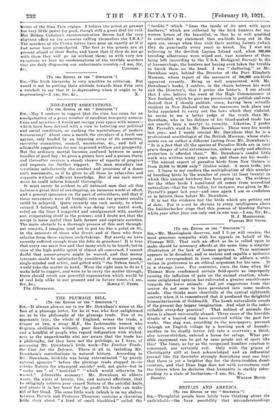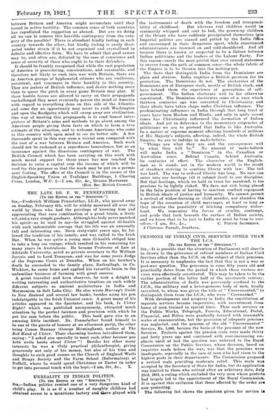BRITAIN AND AMERICA. [To THE EDITOR OF THE " SPECTATOR-"]
Sut,—Thoughtful people have lately been thinking about the unthinkable—the -bare possibility" that misunderstandings
between Britain and America might accumulate until they issued in active hostility. The common sense of both countries has repudiated the suggestion as absurd. But are we doing all we can to remove this horrible contingency from the cate- gory of the possible? There is abundant kindly feeling in each country towards the other, but kindly feeling is easily dissi- pated under strain if it be not organized and crystallized in definite and effective form. We have to admit that good causes may be, and often are, defeated by the ease of conscience and sense of security of those who ought to be their defenders.
It should be frankly recognized that while the vast population of America is peace-loving, conscientious, and reasonable, and therefore not likely to rush into war with Britain, there are in America groups of hyphenated citizens who are vociferous, persistent, and venomous in their hostility to this country. They are jealous of British influence, and desire nothing more than to queer the pitch in every game Britain may play. If these hostile forces are allowed to carry on their propaganda unchallenged they must eventually poison the mind of America with regard to everything done on this side of the Atlantic, and some day an opportunity may occur to rush Washington and open the floodgates which will sweep away our civilization. One way of meeting this propaganda is to send honest inter- preters of Britain's aims and methods to go about among the Ainerican people giving them facts on which to form a true estimate of the situation, and to welcome Americans who come to this country with open mind to see its better side. A few thousands spent in this way seem a trivial sum compared with the cost of a war between Britain and America. Such work should not be reckoned as a superfluous benevolence, but as an insurance against the disastrous contingency of war. The British Council which has been carrying on this work with much moral support for three years has now reached the decision to raise a capital sum the income of which will be used for this purpose so that the work may be put on a perma- nent footing. The office of the Council is in the rooms of the English-Speaking Union at Trafalgar Buildings, 1 Charing Cross, London, W.C. 2.—I am, Sir, &c., DIIGALD MACFADTEN (Hon. Sec. British Council).



































 Previous page
Previous page